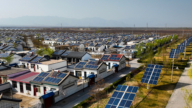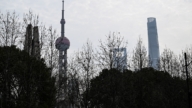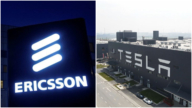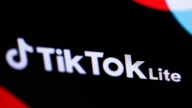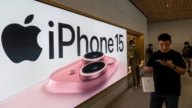【新唐人2013年01月30日訊】據中國大陸媒體報導,截至2012年末,全球新增貨幣供應量超過26萬億元人民幣,中國佔近一半,而中國貨幣投放量餘額逼近億萬大關,位居世界第一,貨幣投放量與GDP的比例也再度創下歷史新高。那麼到底是甚麼原因導致中國貨幣氾濫呢?請看專家分析。
據《21世紀網》數據顯示,2009年以來,中國央行的貨幣供應量,先後超過日本、美國、歐元區,成為目前全球最大的「印鈔機」。 去年(2012年),全球新增貨幣供應量超過26萬億元人民幣,中國佔近一半。
另外根據大陸央行數據,截至2012年末,中國的貨幣投放量(M2)餘額達到人民幣97.42萬億元,居世界第一,接近全球貨幣供應總量的四分之一,是美國的1.5倍,比整個歐元區的貨幣供應量多出不只一個英國全年的供應量。
美國「南卡羅來納大學艾肯商學院」教授謝田指出,中共出於對政權危機的恐懼,不去抗拒通貨膨脹,而是以繼續超發貨幣,保持經濟畸形的增長,導致更大通貨膨脹。
美國南卡羅來納大學艾肯商學院教授謝田:「那從維護政權的角度看,維穩的角度看,失業人口的危害比通貨膨脹的危害要更直接,更顯眼,更明確,所以它基本上是在維護政治的角度,來增長GDP,來降低失業。」
「中國金融智庫」研究員鞏勝利指出,中國的國民生產總值是美國的1/3左右,而貨幣投放量是美國的4倍。
中國金融智庫研究員鞏勝利:「中國貨幣運行質量特別低,比如產出,投入一塊錢,像美國可以產出3塊甚至5塊美金,中國投入一塊錢只能產出0.3元美金。」
鞏勝利進一步指出,中國貨幣運行質量低,有以下三點原因:一、中國財政除了負擔正常國家的政府支出外,還要負擔從少先隊組織到黨支部這個龐大的黨組織支出,此外,婦聯、工商協會、作家協會等一系列的行業協會,也要由國家負擔﹔二、其他國家只有3級構架,而中國政府是7級構架,造成龐大的政府機構﹔另外,中國的各級官員喜歡把自己的親朋好友塞進水、電、煤、氣、土地等國營壟斷企業,造成中國的能源成本特別高。
鞏勝利:「湖南的邵陽這個地級市的水廠,按照正規,這麼一個中等城市的水廠兩、 三百人就行了,但是因為這個水廠是國有的,很多黨政官員的子女全部往裡塞,結果這個水廠超過了上千人,這些國有壟斷型企業基本上都是這樣,成本就必然高,錢從哪裏來呢?只有多發貨幣了。」
鞏勝利還說,因為中國不是市場經濟,貨幣由黨控制,貨幣發行量和增長度沒有依據,同時又沒有其他法治國家市場經濟管理的方法,所以,中國的貨幣發行像「一鍋粥」一樣——亂。
鞏勝利:「2012年上半年,很多地方貨幣不夠用,包括國有企業,包括政府財政,那怎麼辦呢﹖只有發行貨幣,所以中國這鍋亂粥,還得從源頭——市場經濟必備的規律上加以理順,否則貨幣超發的唯一結果就是通貨膨脹。」
謝田:「特權階層的人士,他們總是能從超發的貨幣,從擴大規模的基礎建設,從那些貸款……這些當中得到好處,他們的收入會遠遠超過通貨膨脹的速度,這就是為甚麼我們說,超發貨幣是中國權貴掠奪中國人民財富最快捷、最無恥的一個方法。」
《21世紀經濟報導》評論指出,隨著2012年中國貨幣投放量(M2)餘額逼近百萬億大關,全年GDP達到50萬億,而被用來度量一個國家貨幣超發程度的M2與GDP比例,再度創下歷史新高,已經達到1.88倍。報導說,這是一個危險的信號。
採訪編輯/劉惠 後製/鍾元
China, The World’s Largest Money Printing Machine?
According to Chinese media, as of the end of 2012,
global new money supply surpassed RMB26 trillion, with China accounting for nearly half of it.
China’s M2 has reached 100 trillion, the highest in the world,
and set a record high again on the ratio of currency and GDP.
What is the reason for the proliferation of Chinese currency?
21st Century Network data show that since 2009,
money supply of China’s central bank has surpassed that of Japan, U.S., and the Eurozone.
China has become the world’s largest
money printing machine.
World’s new money supply in 2012 was over RMB26 trillion,
and nearly half of it was from China.
In addition, China’s central bank data shows that at the end
of 2012, the balance of China’s money supply (M2) reached RMB97.42 trillion, the highest in the world.
This was nearly a quarter of the total global money supply,
1.5 times of the U.S. supply, and surpassing that of the Eurozone and UK combined.
Professor Xie Tian from the University of South Carolina’
Aiken Business School commented on the issue.
Prof. Xie said, the Chinese Communist Party (CCP)
does not resist inflation, facing its regime crisis.
It continues to issue money to maintain the abnormal growth
of the economy, leading to greater inflation.
Prof. Xie: “From the perspective of maintaining power and
safeguarding stability, the dangers from the unemployed is more direct, more prominent and more obvious than inflation.
So it maintains power by high GDP
and reducing unemployment."
Researcher at China Finance Think-Tank, Gong Shengli
points out that China’s GDP is about 1/3 of the U.S.’, but its money supply is four times that of the U.S.
Gong Shengli: “The quality of Chinese currency operation
is very low. For example, in the U.S. $1 yields $3 – $5 in investments. In China, it only produces $0.3."
Gong Shengli further pointed out there are three main
reasons for the poor quality of the Chinese currency.
Firstly, China’s expenditure includes not only the normal
government expenses, but those of the huge CCP system too.
Starting from the Young Pioneers to the countless CCP
branches, plus the women’s unions, industry and commerce associations, the writers associations, etc.
Secondly, other countries only have three-level hierarchy,
while the Chinese government is a seven-layer hierarchy, resulting in huge governmental structure and expenses.
In addition, Chinese officials at all levels like to place
their family and friends in state monopolies, like water, electricity, coal, gas, land, etc. enterprises.
This results in particularly high energy costs in China.
Gong Shengli: “Hunan Shaoyang is a third level city.
Its water treatment plant should have about 200-300 people.
Since it is state-owned, officials’ children were put in there.
So this water place has over one thousand employees.
The same applies for all state-owned monopoly enterprises.
The cost is inevitably high.
Where do these money come from?
It can only issue new money."
Gong Shengli also said that China is not a market economy,
and its currency is controlled by the CCP.
There is no base for currency supply and growth.
It also does not have the management system
of a market economy like other countries ruled by a law.
Therefore, China’s currency is a mess.
Gong Shengli: “In the first half of 2012 many places
were short of money, including the local governments.
What could they do?
They have to issue money.
Chinese currency’ issue should be fixed based on the market
economy rules, otherwise it will only result in inflation."
Xie Tian: “The privileged class can always benefit by ultra-
issued currency, expanded scale of infrastructure and loans.
Their income will far exceed the pace of inflation.
That’s why we say ultra-issued currency is the fastest
and most shameless way to rob the Chinese people."
21st Century Business Herald comments that with China’s
money supply (M2) close to 100 trillion in 2012,
and annual GDP of 50 trillion, it has set another record
of M2 and GDP ratio, which measures currency supply.
The report said, this is a dangerous sign.



